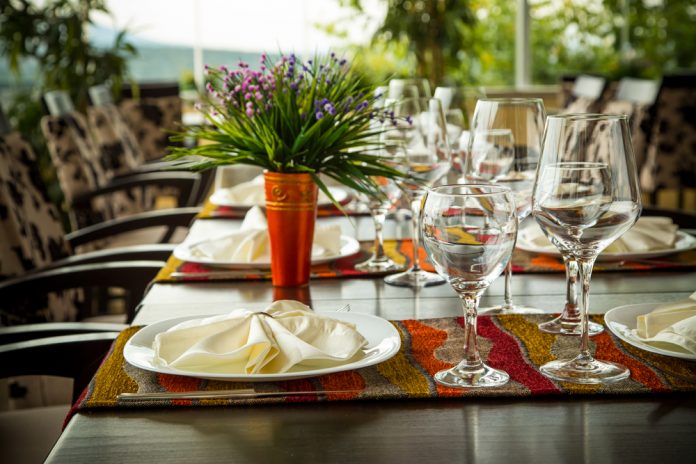When package holidays first became available to the masses, it was enough for the hotels in which they stayed to offer a restaurant for guests that simply provided good, well-cooked food three times a day. They didn’t need to have any kind of unique selling point; indeed, most provided identikit buffets at breakfast, lunch and dinner and just changed one or two options each day to prevent people getting bored during their stay. However, times have certainly changed since those days and hotels are increasingly finding themselves needing to make a special effort to impress travellers when it comes to their dining options.
Getting used to a dining culture Perhaps it’s the fact that we’re so used to eating out in the 21st century, or the plethora of cooking programmes on TV encouraging us to get more adventurous that are making us so discerning over what we eat, but we’re no longer willing to settle for second best. A good culinary offering might even be a driving factor in whether or not guests return more than once, meaning it is inextricably linked to hotel revenues – and that’s a relatively easy way to make money. Software Advice recently carried out a survey on travellers who had stayed at a hotel in the past year, and food was an important part of the holiday experience for almost all of them. A combined 91 per cent reported that it was at least moderately important to them during their break. In contrast, only nine per cent called it minimally important – and nobody at all reported food unimportant.
How to create a culinary experience
Based on this, it’s no longer really enough for hotel owners to simply provide a dining room and assume that’s enough when it comes to their guests’ catering needs. Instead, what they need to do is create special activities and packages that target the interests and foodie culture shared by their guests. But what exactly could this entail? Well, the Software Advice study found that travellers like to combine social occasions with an ability to learn more about their destination through food, with 24 per cent favouring food festivals, 19 per cent enjoying wine tastings and 18 per cent rating brewery tours favourably. Creating and selling packages based on these experiences or similar could be a key way of standing out above the competition and really appealing to visitors.
Hotels that are getting it right
When you’re drawing up potential culinary experiences, you can’t go wrong with taking a look at what’s already out there – what’s working and what isn’t going down well with guests? Think of this as your market research and learn from it as you consider possible options. Although this might take some time, it’s a worthwhile investment, plus you don’t even need to leave the comfort of your home or office to do it. The internet means researching hotel dining experiences is free and you have the whole world at your fingertips, so there’s really no excuse not to be thorough. A quick look around was all we needed to find plenty of examples of hotel restaurants that had hit the headlines by getting their dining options right. For instance, Villa La Massa in Tuscany once offered an Enogastronomic Experience, which included cheese and wine tasting and a truffle-hunting outing with a local expert. This was much-commented upon by visitors. Hayman in Australia’s Whitsunday Islands provided the Chef’s Bench, where up to four guests could enjoy an intimate banquet at which a master chef prepared a 12-course taster menu, all the while offering up kitchen secrets they could copy once they got home. These are just a couple of quick samples of what’s out there, but as you can see, they don’t have to be over complicated or hugely expensive – just appealing.
How about a Hawaiian BBQ on the lawn, or a fish-tasting session on the beach?
The end of the year could be the ideal time to try out festive markets at which cheeses and craft beers from local suppliers abound – just team up with local producers to provide you with what you need.
How to promote your culinary experience
Of course, good food in your restaurant setting will speak for itself, but special and one-off events are going to need promotion if you want would-be guests to know about them. According to Software Advice, 27 per cent like to hear about food-related activities at check-in, 24 per cent prefer to find out about them via the hotel website, 22 per cent like email and 12 per cent favour social media. It’s probably therefore a good idea to do something to cover each one of these bases. Cards left on the bed or a message on the TV will suffice for in-room, while posters in the lobby can be handy too. Hotel landing pages can be a persuasive factor as to whether or not people make a booking in the first place, particularly if you provide lots of tantalising photos and a special package price that covers the period of your special event. And don’t forget to keep it going during the event either. Guests who participate might put pictures of their experience on social media – and the more consumer-generated content there is on your Twitter or Facebook feed, the higher your potential to drive bookings. A final important point is to always open up your restaurant or event to people who aren’t guests. Once frowned-upon, this is now de rigeur for many establishments to show off what they’ve got, capitalise on extra revenue from those who drop by because they need a bite to eat and drive future bookings when they see just how great things are. By getting culinary offerings right, hotels can build up a great reputation for their brand and ensure a steady stream of new business.







